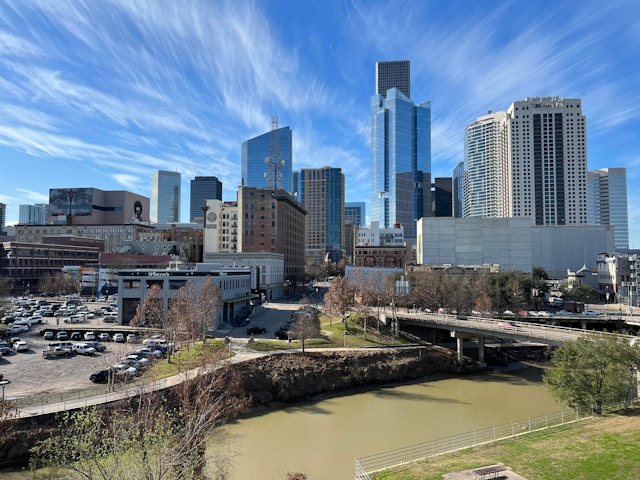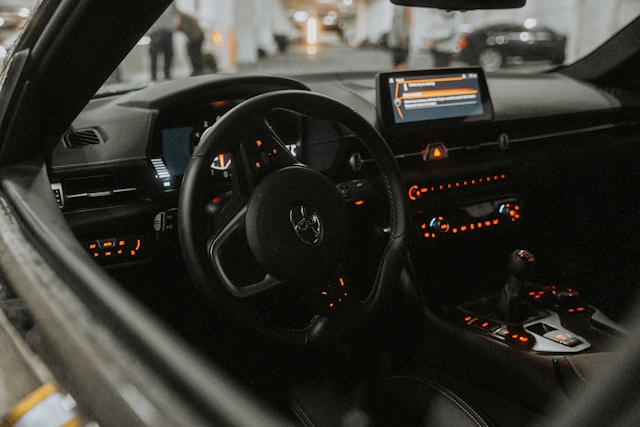
When a car breaks down in Houston, stress often comes before solutions. The city’s heat, heavy traffic, and spread-out highways make a breakdown harder to handle. A clear plan keeps you safe and helps you get moving again. These essential steps will give you practical actions, not guesses, to follow when your car stops running.

If your car still has some power, guide it to the nearest shoulder or side street. Avoid stopping in active lanes since Houston traffic can be fast and unpredictable. Even a few feet can reduce your risk of being hit.
Do not assume drivers will see your stopped car in time. Most rear-end collisions after breakdowns happen because the car was left in moving lanes. Getting out of the path of traffic must be your first action.
Switching on hazards signals to other drivers that something is wrong. It buys you space while you decide on your next step. In Houston’s busy highways, lights give faster warning than waving or shouting.
Research on crash data shows hazard lights reduce rear-end impacts by over 25%. This small step has large benefits and should never be skipped.
Unless the car is smoking or on fire, it’s safer to remain inside. Exiting near high-speed traffic increases your chance of injury. Lock the doors and wait until help is on the way.
Pedestrian accidents on Texas highways are common and deadly. Sitting inside with your belt on gives you more protection from passing cars than standing on the roadside.
Place reflective triangles or flares behind your car if you have them. They create distance and give drivers time to react. Even in daylight, reflective items add visibility.
Keeping this gear in the trunk is a small preparation that pays off when your vehicle quits. A breakdown kit costs little but reduces risks greatly.
If your car is stuck in a live lane and cannot move, call 911. Houston’s freeways are dangerous spots to be stranded. Police can help block traffic until a tow arrives.
Even if you feel embarrassed, safety comes before pride. Emergency calls prevent pileups and keep both you and other drivers safe.
Modern cars give signals before shutting down. Look at the dashboard for icons like oil, battery, or overheating. These signs may tell you if restarting is safe or risky.
For example, an overheating light means do not restart the car. Adding stress to the engine could cause permanent damage. Reading the signals avoids expensive mistakes.
Unusual smells or sounds often reveal the cause of a breakdown. Burning odors suggest overheating or electrical issues. Loud knocks or grinding may point to mechanical failure.
Trusting these senses can guide your next choice. If you hear grinding, do not try to drive further, as it may lock the engine.
Fluids on the ground often explain why the car failed. A green pool hints at coolant, while red may be transmission fluid. Identifying the color helps you share details with a mechanic.
Do not touch unknown fluids. Some, like battery acid, can harm skin. Just note the color and location before calling for help.
Check if lights, horn, and power windows work. These small checks tell you if the battery has failed. A dead battery usually leaves no response at all.
If the battery is fine but the engine won’t turn, the issue may be fuel or starter related. This small test saves time in guessing.
A breakdown in Midtown Houston is not the same as one on I-45 at night. Assess your environment and how exposed you are. If it feels unsafe, call for help sooner rather than later.
Being aware of surroundings keeps you from taking unnecessary risks. Your location should guide your next action plan.
Houston drivers often use services like AAA, insurance add-ons, or credit card roadside programs. Calling them ensures a professional tow or jumpstart. Keep the membership details stored in your phone.
Not having this service means longer waits and higher fees. Planning ahead with a membership prevents surprise expenses.
Call a family member or friend to let them know your location. If something delays the tow, someone else knows where you are. This adds a layer of safety.
Even in a large city, breakdowns can make you feel isolated. Sharing your status keeps you calmer and connected.
When talking to assistance, give cross streets, mile markers, or landmarks. Houston’s road network is wide, and vague instructions can delay service. Use apps to share your location if needed.
Specific directions save both time and money. Tow trucks rely on precision to avoid searching for you.
If the breakdown makes you late, send a quick message to work or appointments. This prevents misunderstandings and stress later. People usually appreciate honesty over silence.
A short text can reduce the pressure you feel about missing deadlines. It’s a practical move while you wait.
Panic often leads to unclear directions. Speak slowly and give only the facts. Assistance arrives faster when details are accurate.
Calm speech also reassures whoever you’re calling. It builds trust that you are managing the problem responsibly.

Houston heat is intense, especially in summer. If the car’s air conditioning is gone, open windows slightly. Stay hydrated if you have water available.
Heat exhaustion can sneak up on drivers stuck roadside. Taking small steps protects your health during delays.
If it’s dark, use interior lights sparingly to show you’re inside. This makes it easier for tow trucks to spot you. Visibility shortens the wait time.
A flashlight can also help signal your position. Keeping one in your glovebox is a smart backup.
Lock your valuables in the trunk or hide them from view. Houston has areas where theft risk is higher during breakdowns. Preventing temptation protects your property.
Thieves look for easy targets, not locked-down cars. Keeping items hidden reduces your risk significantly.
Use your phone only for needed calls or updates. Streaming or browsing wastes battery when you may need it later. Carrying a power bank can save you in long waits.
Houston breakdowns can mean delays of an hour or more. Battery management ensures you remain reachable throughout.
While waiting, keep an eye on people and vehicles nearby. Do not engage with strangers offering rides. Safety comes first until official help arrives.
Most drivers are kind, but not all have good intentions. Awareness gives you control in uncertain situations.
If the breakdown is from a flat, check if your spare is usable. Many drivers forget to inflate or maintain it. A working spare saves hours of waiting.
If the spare is also flat, do not risk driving on it. Call for a tow instead of making the damage worse.
Many Houston drivers carry jump starters now. Unlike jumper cables, they don’t require another car. This device can restart a dead battery in minutes.
They’re safe and simple to use with basic instructions. Carrying one prepares you for the most common roadside issue.
A snapped belt or loose hose is often visible. If the damage looks serious, do not attempt roadside fixes. For minor slips, reseating may help temporarily.
Still, these fixes only buy time to reach a repair shop. Permanent repairs require proper tools and expertise.
If you carry coolant or oil, topping off may let you reach a shop. Only do this if you know the levels are low and the engine is cool. Adding fluid to a hot engine can be dangerous.
This fix should be done with care, not guesswork. Incorrect fluids or timing can worsen the problem.
Some drivers attempt big repairs on the roadside. In Houston traffic, this is not safe. Limit yourself to simple, quick fixes only.
A tow may feel costly, but injuries and extra damage cost more. Know your limits and act wisely.

Most breakdowns are preventable with routine service. Oil changes, brake checks, and tire rotations reduce sudden failures. Treat maintenance as investment, not expense.
Skipping small checks often leads to costly repairs later. A reliable car is built on consistent care.
A kit with water, first aid, flashlight, and jumper cables helps in every breakdown. Houston drivers often forget this until it’s too late. Preparation saves stress.
Kits can be customized to your needs. Add snacks, phone chargers, or reflective vests to stay ready.
Knowing how to change a tire or add oil can save time. Even simple knowledge builds confidence during breakdowns. Take a short class or watch tutorials in advance.
Confidence matters when you’re alone on Houston roads. Skills give you options before help arrives.
Keep contact numbers of at least two local towing companies. Houston is large, and response times vary. Having options reduces waiting during busy times.
Store these numbers in both your phone and glovebox. That way, you’re never left searching during a crisis.
Check if your insurance or credit card already covers breakdown services. Many drivers pay twice for what they already have. Reviewing your plan avoids waste.
Knowing coverage details in advance saves panic when your car stalls. Clear knowledge equals faster action.